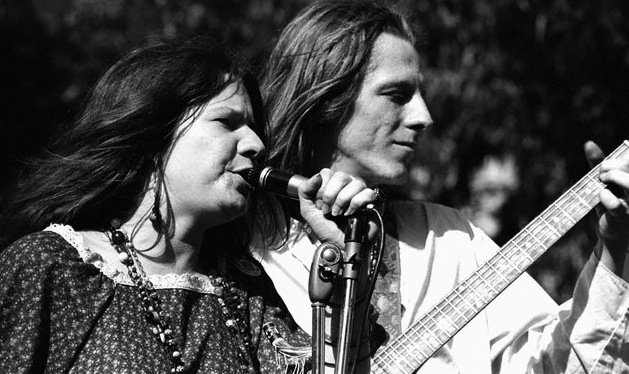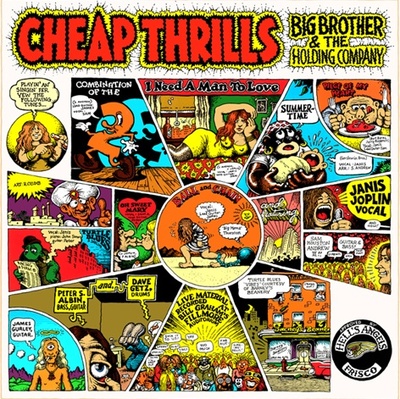Janis Joplin and James Gurley: ‘When James was around, life seemed to be magnified,’ said Gurley’s Big Brother bandmate Sam Andrew‘The Yuri Gagarin of Psychedelic Guitar’
James Gurley
December 22, 1939-December 20, 2009James Gurley, hailed as "the father of psychedelic guitar" for his work with Big Brother and the Holding Company, died of a heart attack on December 20 at a Palm Springs, CA, hospital. He was 69.
Upon hearing of Gurley's death, Sam Andrew, his bandmate in Big Brother, posted his condolences on the Big Brother and the Holding Company website (http://www.bbhc.com/), calling Gurley "the most unusual person I ever met, a pioneer, a real original, a very funny man and truly alive with energy that not many people have.
“When James was around, life seemed to be magnified,” Andrews continued. “Everything was more interesting, had more meaning, was more vital. He kept that energy right up to now, really. He and I did a set of interviews together in San Diego at the beginning of last summer and he was as wry and spry as ever.”
Another Big Brother member, Dave Getz, recalled his first experience at a Big Brother concert, before he joined the band as its drummer. During the song “Oh My Soul,” Peter Albin stepped out, singing and “playing bass like a madman,” but “when James’ guitar solo started the whole audience was drawn toward the stag. I’d never seen anyone lay guitar like that, heard a sound like that. It was this frenzy of notes that took one to the kind of place that people like Ornette Coleman and John Coltrane were tryng to reach, not something you expected to hear from a rock band. The energy was incredible.
“James was the star of Big Brother,” Getz added, “and then Janis came along.”
Gurley’s sound was intense and searing, but in using fingerpicks instead of flat picks he also developed a spacey, otherworldly tone that became a hallmark of the psychedelic San Francisco sound. Country Joe & the Fish’s guitarist Barry Melton called Gurley “the first man in space. He’s the Yuri Gagarin of psychedelic guitar.”
When the electrifying, possessed Janis Joplin ascended from the band’s featured vocalist upon joining in 1966 to being lead singer and visual focal point, Big Brother soared, its signal moment being an incendiary appearance at the 1967 Monterey Pop Festival, captured on film in D.A. Pennebaker’s documentary, Monterey Pop. Signed to Columbia Records, the band saw its debut album, Cheap Thrills, with cover art by R. Crumb, topping the chart and producing one of the monuments of ‘60s music in its wrenching treatment of “Piece of My Heart.” But in 1968 Joplin went solo, and with her, Sam Andrew, as part of for her new Kozmic Blues Band. Big Brother went on hiatus, with Getz and Peter Albin joining Country Joe & the Fish for a European tour. Gurley’s life went into a cataclysmic spiral when his wife, Nancy, died of a drug overdose and he was charged with second-degree murder for having injected her. Even before he was sentenced to probation, he had begun pulling his life back together.
“James cut his hair, started playing the bass, moved out of the City and into my house in Marin for about a month (during the period of his trial), then eventually bought a house in Marin,” Getz writes. “He also fathered another son during this period. This was also a very creative and beautiful time for Big Brother and we produced music that I’m still proud of today. James was the bass player, Peter moved over to guitar. James’ bass playing was creative and unique, and it inspired me to be just as creative with what I played on the drums. This period again lasted about two years but eventually was brought to ruin by drugs, egos and the weight of our own history.”
Big Brother and the Holding Company, ‘Piece of My Heart’; James Gurley does his thing big-time beginning at 2:37.Getz is referring to the band’s 1987 reunion, when it began touring again. However, Gurley left in 1997 over a dispute with other band members who wanted to add a female vocalist to the lineup. In his website note, Getz references the bad blood ensuing from this dispute and Gurley’s exit. “I will not write about what happened between James and me or between James and other members of Big Brother. It wasn’t pretty; it wasn’t a happy ‘parting of the ways.’ Yet despite that, and despite all the things that happened and whatever negative things he’s said about me or about anyone else in Big Brother over the last 12 years, the bottom line is that I still had and have a lot of love in my heart for James, and I cried a little yesterday.”
Gurley was last heard on record in his 2000 solo album, Pipe Dreams. He spoke out in defense of Big Brother in 2007, upon Cheap Thrills being voted into the Grammy Hall of Fame, saying the band was “the most maligned ever.” In an excellent documentary about Big Brother, Nine Hundred Nights, all kinds of charges flew: Janis left at the urging of manager Albert Grossman, who convinced her she could make more money using studio musicians instead of the band on her albums; Janis felt trapped singing the Big Brother material; Clive Davis engineered her departure, saying studio musicians could play better than Big Brother. In its heyday—that is, the Joplin period—Big Brother was routinely regarded by the press as a sloppy band, not incapable of playing up to Joplin’s level as a vocalist, but rather not focused enough to maintain a high standard of musicianship over the course of a concert or recording. However, Nine Hundred Nights proves a strong defense of the Big Brother musicians’ artistry, a case bolstered by testimony from knowledgeable, unassailable supporters such as writer-historian-Patty Smith guitarist Lenny Kaye. Though the Kozmic Blues Band, with its robust horn section, provided a richer sonic backdrop for Joplin, live recordings—and those who saw it live—attest to it also being an often clunky outfit, plodding where it should have been strutting or sprinting, and rarely producing either the sheer, brute force or tension-riddled solemnity that fueled Joplin’s sense of interpretive drama. In the end, she and Big Brother and the Holding Company made lasting art together.
“There was only a handful of us that created our mini-genre of psychedelic guitar,” Barry Melton noted, “and James was the avatar who blazed the path for the rest of us. Go in peace, James.”
James Gurley is survived by his wife, Margaret Nelson Gurley, and sons Hongo Ishi and Django Gurley.
Founder/Publisher/Editor: David McGee
Contributing Editors: Billy Altman, Laura Fissinger, Christopher Hill, Derk Richardson
Logo Design: John Mendelsohn (www.johnmendelsohn.com)
Website Design: Kieran McGee (www.kieranmcgee.com)
Staff Photographers: Audrey Harrod (Louisville, KY; www.flickr.com/audreyharrod), Alicia Zappier (New York)
E-mail: thebluegrassspecial@gmail.com
Mailing Address: David McGee, 201 W. 85 St.—5B, New York, NY 10024



